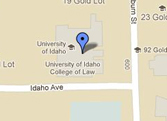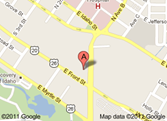College of Law
Moscow

uilaw@uidaho.edu
Administration Office: 208-885-2255
Dean’s Office: 208-885-4977
fax: 208-885-5709
Menard 101
711 S. Rayburn Drive
Mailing Address:
College of Law
University of Idaho
875 Perimeter Drive MS 2321
Moscow, ID 83844-2321
Boise
First Monday - July 5, 2011
Note: Because the “First Monday” of July, 2011, is Independence Day, this edition of our monthly news e-brief is being distributed on July 5.
In this issue:
- College Expands Opportunities for Specialized and Interdisciplinary Studies
- College Undertakes Administration of State Law Library
- Legal Aid Clinic Secures Justice for Low-Income Taxpayers
College Expands Opportunities for Specialized and Interdisciplinary Studies
In order to prepare students for diverse careers in the practice of law, the judiciary, public service, and a host of law-related professions, the College of Law is expanding opportunities for students to pursue specialized learning in areas of curricular emphasis and to earn concurrent degrees in areas of interdisciplinary collaboration. As noted in recent editions of “First Monday,” the College has created emphases in Natural Resources and Environmental Law (NREL) and Native American Law, drawing upon the strength of faculty within the College as well as upon the College’s connections across the Moscow campus and upon the College’s relations with tribes throughout Idaho and the Northwest. Most recently, the College has established an area of emphasis in Litigation and Alternative Dispute Resolution (LADR), combining the depth of our faculty in litigation practice, courtroom advocacy, negotiation, and mediation, with the expertise of visiting faculty in the College’s intensive Trial Advocacy program and the Northwest Institute for Dispute Resolution. Each area of emphasis features a rigorous curricular pathway that synthesizes doctrinal knowledge and skills, and leads to special recognition on a graduating student’s transcript. A similar emphasis in business law and entrepreneurism, now being developed by the College’s faculty in Moscow and Boise, is taking shape and is expected to be available in the future.
These enhanced opportunities for specialized study are complemented by an increase in concurrent degrees offered by the College of Law through interdisciplinary cooperation with other colleges of the University of Idaho and with other institutions. The College of Law has long collaborated with the University of Idaho College of Business & Economics in offering the combined Juris Doctor and Master of Accountancy degrees. Recently, the College of Law established a similar collaboration with the Boise State University College of Business & Economics. A concurrent Juris Doctor/Masters of Business Administration program, in cooperation with BSU, is nearly finalized, and the possibility of a similar collaboration with Idaho State University is under consideration. On the Moscow campus, the College of Law offers the combined Juris Doctor/Master of Environmental Science degrees in collaboration with the University of Idaho College of Graduate Studies. These two colleges and a University-wide array of faculty also offer the highly successful “Waters of the West” program, combining the Juris Doctor degree with a Master’s degree and/or a Ph.D. degree in Water Resources. This interdisciplinary fusion of law and science is distinctive among the water-related graduate programs offered by land-grant universities in the western United States. The newest addition to the roster of interdisciplinary concurrent degree programs is expected to be a combination of the Juris Doctor degree with a Master of Science in Bioregional Planning & Community Design. This program, to be offered by the College of Law in collaboration with the College of Graduate Studies and the College of Art & Architecture, has been endorsed by the participating faculties and is being submitted for final approval by the State Board of Education.
Thus, the Juris Doctor degree, long recognized for its versatility and power in unlocking doors of career opportunity, now derives additional strength at the University of Idaho from programs leading to specialized expertise and to knowledge that transcends disciplinary boundaries. Further information about these programs can be obtained at the College of Law website and from the following faculty members: Professor Barbara Cosens, NREL, “Waters of the West,” and concurrent degrees in law, environmental science and water resources; Professor Angelique EagleWoman, Native American law; Professors Maureen Laflin and Alan Williams, LADR; Professor Benjamin Beard and Associate Dean/Boise Lee Dillion, business law and entrepreneurism; Associate Dean Elizabeth Brandt, concurrent degrees in law, accounting, and business administration; and Professor Jerrold Long, concurrent degrees in law and bioregional planning and community design.
College Undertakes Administration of State Law Library
Evidence of collaboration between the College of Law and the Idaho Supreme Court is now on tangible display at the Idaho State Law Library. In March of this year, the State Law Library moved from its location at the Key Bank building in downtown Boise to the 5th floor of the University of Idaho Boise Center (the “Idaho Water Center” building), which is also the home of the College of Law’s third-year program in Boise. Under a memorandum of agreement between the University of Idaho and the Supreme Court, the College of Law has now assumed responsibility for the operation of the State Law Library. The College plans to develop and improve the library as a resource for legal education, the legal profession, the judiciary, other branches of state government, and the public. The co-location of the College’s third-year program and the State Law Library is an important step toward ultimately fulfilling the vision, shared by the Supreme Court and the University of Idaho, of an Idaho Law Learning Center (ILLC). The ILLC is the designated future use of the old Ada County Courthouse, situated directly adjacent to the State Capitol and the Idaho Supreme Court. The ILLC is expected to become a permanent home for the College’s Boise programs, for judicial education, and for the law library – as well as a distinctive venue for law-related outreach and civic education -- upon completion of renovations to the historic courthouse.
The benefits of this collaboration are already manifest. Law students now have access to a 30,000 volume collection of legal materials to supplement their academic coursework and clinic experience. Likewise, library patrons can access a variety of electronic resources, using the publicly accessible Westlaw terminals or many of the legal and non-legal databases offered by the College of Law. The new location offers quick access to and from the “new” Ada County Courthouse. Its close proximity to other courts and to the downtown legal community will also allow the Law Library to conduct outreach programming to the bench and bar, leveraging the usefulness of the library’s materials and resources.
In addition to the physical merger of the State and University library collections in Boise, the State Law Library has completed a successful integration of its online catalog into the Washington Idaho Network in June. Through this integration, the collections of the University of Idaho Main Library, UI Law Library, and the State Law Library can be easily and simultaneously searched. The law library staff in Boise also will provide assistance in requesting materials from the UI Law Library in Moscow as well as from other University of Idaho libraries on the Moscow campus. The Boise library staff includes Rhonda Willoughby, Kris Quigley, and Nick Toennis. Professor Michael Greenlee, a member of the University of Idaho Law library faculty, who has moved to Boise and will be replaced with a new hire in Moscow, serves as the Associate Law Librarian in charge of the Boise library operation, under general supervision of Professor John Hasko, Director of the University of Idaho Law Library.
Further information is available from Professor Greenlee. Visitors are warmly welcomed to drop in and view the State Law Library location in its new location:
Idaho State Law Library
322 E. Front St., Suite 560
Boise, ID, 83702
phone: 208-364-4555
e-mail: lawlibrary@idcourts.net
Operating hours: 8:00 a.m. to 5:00 p.m. (Mountain Time),
Monday through Friday.
Legal Aid Clinic Secures Justice for Low-Income Taxpayers
The Low-Income Taxpayer Clinic (LITC), a part of the College’s Legal Aid Clinic, is demonstrating its value in providing skills education to our students while securing justice for needy clients. The LITC, funded by a grant from the U.S. Internal Revenue Service, and supervised in Boise by College of Law clinical instructor Barbara Lock, has made its impact felt in a string of recent cases that are small when measured in dollars but significant when measured by the educational value to the students and the personal importance to the clients.
In one illustrative case, the LITC helped clients untangle a dispute with the IRS that arose from many years of non-filed tax returns. The taxpayers had wrongly assumed they had no filing obligation if, as they believed, they owed no federal tax. After assembling records and helping the clients submit returns, the clinic, in cooperation with the IRS Taxpayer Advocate’s Office, was able to resolve the outstanding issues -- even obtaining a determination that the clients were entitled to a refund. The story of this case was recently highlighted on Boise television.
Often the LITC’s cases present issues of non-filing coupled with health problems and disability. In one recent case the clinic sorted out a client’s disorganized records, helped the client file the necessary returns, and obtained a decision by the IRS not to pursue payment from the client – a victim of strokes who had been disabled since 2005 -- in light of his financial circumstances. In another case, the clinic spotted a mistake in an IRS lawyer’s calculations, resulting in a determination that the client was entitled to $700. The client, an elderly man whose wife had Alzheimer’s disease and who was living on a fixed income, was “thrilled” by the outcome.
Occasionally, the LITC encounters an issue of state taxation that is ancillary to a federal tax controversy. One such case involved a currently disabled and unemployed client who in past years had worked in several states for a single employer. Based upon the address where the taxpayer received his mail, one of the states had assessed delinquencies for all of the client’s working years. The clinic researched the records, obtained a statement from the employer, assisted the client in filing appropriate returns, and represented the client in obtaining a year-by-year correction of his state income tax liability.
In these cases, and others, the law students, working under Professor Lock’s supervision, have learned valuable, practical lessons about client communications, factual and legal research, and effective advocacy. More information about the LITC is available from Professor Barbara Lock.


